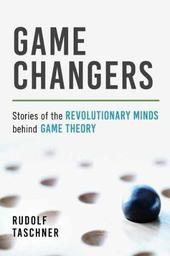
|
Game Changers: Stories of the Revolutionary Minds behind Game Theory
Paperback / softback
Main Details
| Title |
Game Changers: Stories of the Revolutionary Minds behind Game Theory
|
| Authors and Contributors |
By (author) Rudolf Taschner
|
| Physical Properties |
| Format:Paperback / softback | | Pages:237 | | Dimensions(mm): Height 228,Width 154 |
|
| Category/Genre | Philosophy - logic |
|---|
| ISBN/Barcode |
9781633883734
|
| Classifications | Dewey:519.3 |
|---|
| Audience | |
|---|
|
Publishing Details |
| Publisher |
Prometheus Books
|
| Imprint |
Prometheus Books
|
| Publication Date |
22 September 2017 |
| Publication Country |
United States
|
Description
In this lively history of game theory, a gifted math educator and science writer explains for lay readers the uses and value of this innovative yet easy-to-understand approach to mathematical modeling. Essentially, game theory interprets life as a game with mathematical rules. By following the rules, decisions can be calculated that result in the greatest benefit for all participants. The author takes the reader from the 17th century through the Cold War to today's age of turbo capitalism. Along the way he introduces such leading contributors as Blaise Pascal in the 17th century, who invented the theory of probability; Ludwig Wittgenstein in the 20th century, who conceived of the world as a play of words; John Nash (the subject of A Beautiful Mind) in the 1950s, who laid the foundation of modern game theory; and today's practitioners who apply the theory to global finance and military strategy. As the author shows, game theory is more than a type of cost-benefit analysis; ultimately, it is a quest for meaning.
Author Biography
Rudolf Taschner is the author of many books on mathematics and its cultural implications, most recently, The Number That Came in from the Cold- When Math Turns into an Adventure. He has been a professor at the Vienna University of Technology (TU) since 1977. Together with his wife and other colleagues, Taschner founded and runs "math.space," a series of events that presents mathematics as a cultural achievement, located in Vienna's Museumsquartier. In 2004, Taschner was elected "Scientist of the Year." In 2011, he was awarded the Prize for People's Education of the City of Vienna.
Reviews""How do you bluff at poker, bring Al or Capone (or both) behind bars, and question the origins of morality? Game Changers compellingly makes the case that, one way or another, games of chance, and strategies for such games, inform most of what humans do. As one of its historical protagonists puts it, games are the 'golden mean between debate and combat.' This is an eminently readable tour d'horizon, engaging and rich in historical detail. Meeting the brilliant pioneers of game theory up close, you cannot help but marvel at the many subtle and not-so-subtle ways by which chance affects your life, for better or for worse." --Arno Berger, PhD, Associate Professor, Department of Mathematical and Statistical Sciences University of Alberta "Taschner takes the reader through the history of game theory, by not only highlighting mathematicians but also statesmen like Benjamin Franklin and composers like Wolfgang Amadeus Mozart. This is an amazing read for mathematicians and the general readership. Enjoy!" --Alfred S. Posamentier, PhD, Professor Emeritus of Mathematics Education and former dean, CCNY, City University of New York "The story of game theory has never been told in such an elegant and entertaining way. Rudolf Taschner takes us on a journey of contemporary math from the times of Mozart through the Vienna of the twenties and thirties to modern Princeton. He is as much an artful educator as he is a storyteller." --Anne-Catherine Simon, author, journalist, and arts editor for the Austrian newspaper, Die Presse "Brain food served by Rudolf Taschner: rich, smooth, and tastier than a Viennese cake." --Karl Sigmund, author of Games of Life "A beautiful rendition of historical facts blended with novel license to enrich our understanding of the progression of game theory. Examples abound to illustrate number sequence and meaning. This is a book that captures our imagination while educating us in history as well." --Ira Esformes, MD, former chief of Orthopedics and present chairman of the Department of Surgery at Hackensack University Medical Center, Pascack Valley Hospital "In his book, Taschner weaves in cameos of the main players of game theory, managing to present dry history as fictionalized, suspenseful stories." --Austria Presse Agentur (Austrian National News Agency)
|